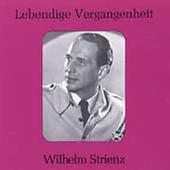Music:
Member Since: 9/21/2006
Band Members: Wilhelm Strienz was born in Stuttgart on Sunday, 2 september 1900, the fifth child of August Wilhelm and Marie Emilie Strienz. He had from the beginning, and retained throughout his life, an interest in astronomy and he was delighted that in 1910 and again in 1986 he was able to see Halley's comet. He was indeed of a scientific turn of mind and even put together, around 1915/16, some designs for a submarine which he presented to Ferdinand, Graf von Zeppelin. The Graf recommended Strienz's construction plans to Germania-Werft Krupp in Kiel, and they were impressed. During the last months of the war, Strienz became a naval cadet. After the war he embarked on a career in commerce, but when a close friend of the family, Martha Fuchs, (later a well-known soprano) heard that he was musically talented in piano and composition, she introduced him to Oskar Schroeter, the director of the Stuttgart Conservatory. He was fashinated overall by the young man's talents, but most of all by his voice. Schroeter arranged that the well-known baritone Theodor Scheidl (1880-1959) give him singing lessons; Strienz was his only pupil. Professor Max Lang became his piano teacher, and Schroeter himself coached him in opera. In 1921 Lang recommended Strienz to his friend Intendant G. Hartmann from the Deutschen Opernhaus in Berlin-Charlottenburg. He sang four arias, and was engaged in a minor position. After further study with Bachner and Reuss-Belce (who had sung under Wagner at Bayreuth), Strienz on 10 January 1922 made his debut as the Hermit in Der Freischütz at the Deutschen Opernhaus, and was during the season of 1922/23 a member of their company. As early as 20 April 1923 Strienz gave his first concert in Berlin, giving works by Schubert and Gretchaninov, arias by Haydn, Verdi and Tchaikovsky; he had considerable success, and was well reviewed. He also, at about this time, made his first radio broadcasts. Strienz moved next to Wiesbaden, but the stage there burned down. Intendant Hagemann was asked by Intendant Keller from the Pfalztheater in Kaiserslautern to lend Strienz to him. There he had to sing the whole repertory. Among the roles which he studied there, with Rudolf Moralt, were Daland in The Flying Dutchman, King Marke in Tristan, Rocco in Fidelio, Mephisto, Stadinger in Waffenschmied, Micha in The Bartered Bride and Truffaldino in Ariadne Auf Naxos. In the season of 1924/25 Strienz was again in Wiesbaden. The programmes show that he played Antonio in Le Nozze di Figaro, the Hermit in Der Freischütz, the Second Prisoner in Fidelio, etc. The leading conductor of this season was Otto Klemperer. 1925/26 saw Strienz in Bremen; new roles were Colline in La Bohème and Zuniga in Carmen, and it was here that he first met young Gerhard Hüsch. At this point the great singer's career became more radio-orientated, for he was engaged by Ernst Hardt to broadcast for the newly founded Westdeutscher Rundfunk in Cologne - as first bass. The seven ensuing years were later recalled by Strienz to have been the best in his entire career. He had to cope with all the important bass parts, and his repertory grew. There he sang Bach, Mozart, Lortzing, Verdi, Wagner and Weber, with colleagues like Schorr, Erb and Bindernagel. In 1933 the Nazi entered Germany. Strienz, who was never a member of the party, or of other similar organisations, was dismissed on 16 October 1933 as ideologically intolerable; he lost his pensionable position, and was prohibited from performing in Germany for the next two years. In October 1933 he went to Berlin, where he lived in his sister's house. He tried to earn some money. A few records show him as a refrain singer for a dance band, and he took small parts in films. By 1935, however, things had begun to improve, and he became once again a popular radio artist. After the above-mentioned recording of Die Zauberflöte (December, 1937, Berlin) Walter Legge visited Strienz, inviting him to Covent Garden for the 1938 season. There he again sang, under Beecham, Sarastro - with Richard Tauber, Gerhard Hüsch, Erna Berger and Tiana Lemnitz; also King Henry in Lobengrin, with Kirsten Flagstad and Lauritz Melchior. Wilhelm Furtwängler conducted Siegfried with Lauritz Melchior and Rudolf Bockelmann, Strienz appearing as Fafner. An invitation to appear at the Vienna Staatsoper followed swiftly.
Record Label: Various
Type of Label: Major
